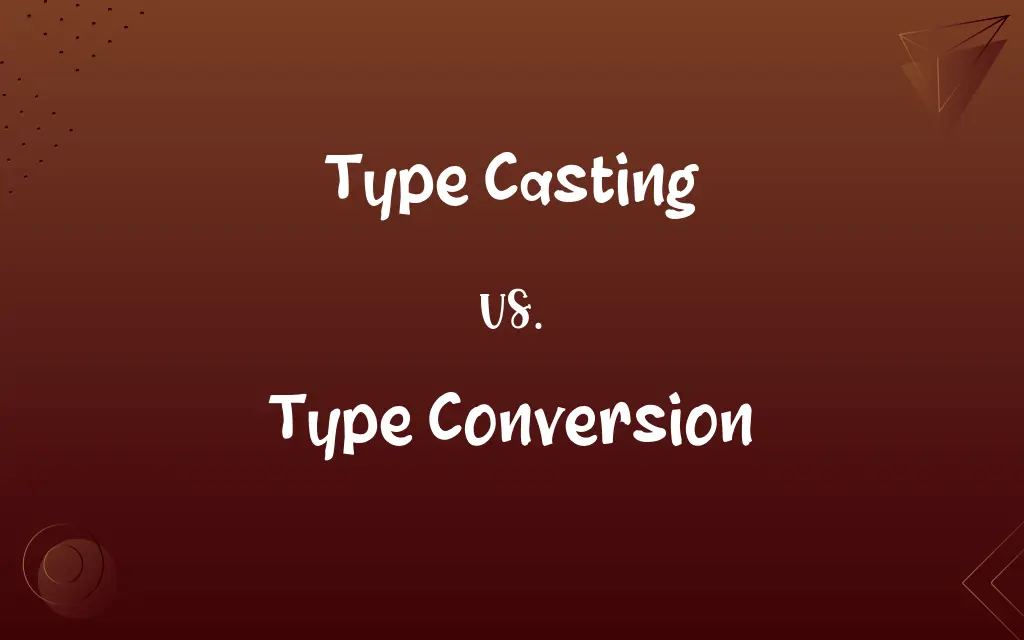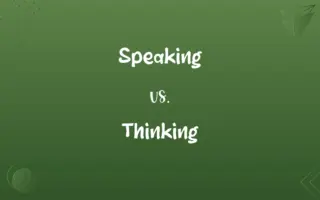Type Casting vs. Type Conversion: Know the Difference

By Hifza Nasir & Dua Fatima || Published on September 18, 2024
Type Casting is explicitly changing a variable's type, while Type Conversion can be automatic, adapting types for compatibility.

Key Differences
Type Casting involves explicitly converting a variable from one type to another by the programmer. Type Conversion, on the other hand, can be automatic or implicit, where the compiler or interpreter automatically converts one data type to another.
Dua Fatima
Sep 18, 2024
Type Casting is usually done when the programmer wants to ensure that the variable is treated as a different type, often for operations that require a specific type. For example, converting an integer to a float to perform division that includes decimal points. Type Conversion happens when operations involve mixed data types, and the language implicitly converts one to the other to avoid errors. For example, adding an integer to a float will automatically convert the integer to a float.
Hifza Nasir
Sep 18, 2024
In Type Casting, the control is in the hands of the programmer, allowing for more precision but also requiring careful consideration to avoid data loss or errors. For instance, casting a float to an integer will truncate the decimal part, which might not be the desired outcome in some cases.
Hifza Nasir
Sep 18, 2024
Type Conversion can make code more readable and easier to write by handling data type adjustments automatically. However, it can also lead to unexpected results if the automatic conversion isn't what the programmer intended, especially in languages where the conversion rules aren't clear or consistent.
Hifza Nasir
Sep 18, 2024
Type Casting often requires a specific function or operation defined by the programming language, such as int() or (int) to convert a value to an integer. Type Conversion's syntax is less explicit, as it happens automatically during the operation.
Dua Fatima
Sep 18, 2024
ADVERTISEMENT
In terms of syntax, Type Casting often requires a specific function or operation defined by the programming language. Type Conversion's syntax is less explicit, as it happens automatically during the operation.
Hifza Nasir
Sep 18, 2024
Comparison Chart
Definition
Explicitly converting a variable's type by the programmer.
Automatically converting a variable's type by the compiler/interpreter.
Dua Fatima
Sep 18, 2024
Control
Programmer-controlled, requiring explicit instructions.
Compiler/interpreter-controlled, often implicit.
Hifza Nasir
Sep 18, 2024
Data Loss
Possible, especially when converting from a more precise to a less precise type.
Less likely, but can occur in certain automatic conversions.
Hifza Nasir
Sep 18, 2024
Syntax
Requires specific syntax or functions, e.g., int() in Python, (int) in C++.
No explicit syntax required; occurs automatically during operations.
Hifza Nasir
Sep 18, 2024
ADVERTISEMENT
Purpose
Used when precision and specific type treatment are necessary.
Facilitates operations between mixed data types, enhancing code readability.
Hifza Nasir
Sep 18, 2024
Type Casting and Type Conversion Definitions
Type Casting
Requires knowledge of syntax.
(int) 5.6 in C++ explicitly converts 5.6 to 5.
Hifza Nasir
Feb 26, 2024
Type Casting
Used for precision.
Double(5) in Java ensures 5 is treated as a double for precise calculations.
Hifza Nasir
Feb 26, 2024
Type Conversion
Compiler/Interpreter-controlled.
'5' + 2 in JavaScript automatically converts '5' to a number, resulting in 7.
Hifza Nasir
Feb 26, 2024
ADVERTISEMENT
Type Casting
Can lead to data loss.
Int(5.99) results in 5, losing the decimal part.
Hifza Nasir
Feb 26, 2024
Type Conversion
Convenience.
3.14 + True in Python treats True as 1, resulting in 4.14.
Hifza Nasir
Feb 26, 2024
Type Conversion
Seamless operation.
Adding an int to a float in Java automatically uses float arithmetic.
Hifza Nasir
Feb 26, 2024
Type Casting
Programmer-controlled.
Casting a float to an integer in Python using int(5.6) results in 5.
Hifza Nasir
Feb 26, 2024
Type Conversion
Language-dependent.
Python's addition of an integer and a string throws an error, requiring explicit conversion.
Dua Fatima
Feb 26, 2024
Repeatedly Asked Queries
How does Type Casting differ from Type Conversion?
Type Casting is explicit and programmer-controlled, while Type Conversion is automatic and managed by the language's compiler or interpreter.
Hifza Nasir
Sep 18, 2024
Is Type Conversion always safe?
Not always; Type Conversion can lead to unexpected outcomes if the automatic conversion isn't what the programmer intended.
Shumaila Saeed
Sep 18, 2024
Why is Type Casting necessary?
Type Casting is necessary for operations that require variables to be of a specific type, ensuring correct and precise outcomes.
Dua Fatima
Sep 18, 2024
How do you perform Type Casting in Python?
In Python, Type Casting is done using functions like int(), float(), and str() to convert between data types.
Dua Fatima
Sep 18, 2024
What is Type Conversion?
Type Conversion is the automatic or implicit conversion of a data type into another by the compiler or interpreter.
Hifza Nasir
Sep 18, 2024
Can Type Casting lead to data loss?
Yes, Type Casting can lead to data loss, such as when casting from a float to an integer, which truncates the decimal part.
Shumaila Saeed
Sep 18, 2024
Can all types be automatically converted in Type Conversion?
No, not all types can be automatically converted; some require explicit casting, depending on the language and the types involved.
Hifza Nasir
Sep 18, 2024
What is Type Casting?
Type Casting is the explicit conversion of a variable's data type to another by the programmer.
Dua Fatima
Sep 18, 2024
What is an example of Type Conversion in Java?
In Java, adding an integer to a float automatically converts the integer to a float for the operation.
Hifza Nasir
Sep 18, 2024
How do languages handle Type Conversion differently?
Languages have different rules and mechanisms for Type Conversion, influencing how seamlessly and safely types are converted.
Dua Fatima
Sep 18, 2024
Is Type Casting available in all programming languages?
Most languages support some form of Type Casting, but the syntax and capabilities can vary widely.
Hifza Nasir
Sep 18, 2024
Can Type Conversion be overridden or customized?
In some languages, yes; developers can define custom conversion rules or override existing behaviors, though this depends on the language's flexibility.
Hifza Nasir
Sep 18, 2024
What is the risk of automatic Type Conversion?
The risk lies in unintended conversions that might lead to incorrect results or runtime errors.
Hifza Nasir
Sep 18, 2024
What happens if Type Casting is done incorrectly?
Incorrect Type Casting can lead to errors, unexpected behavior, or loss of data, depending on the conversion performed.
Shumaila Saeed
Sep 18, 2024
How does Type Conversion enhance code readability?
By handling data type adjustments automatically, Type Conversion can make code more concise and readable.
Dua Fatima
Sep 18, 2024
Share this page
Link for your blog / website
HTML
Link to share via messenger
About Author
Written by
Hifza NasirCo-written by
Dua Fatima








































































